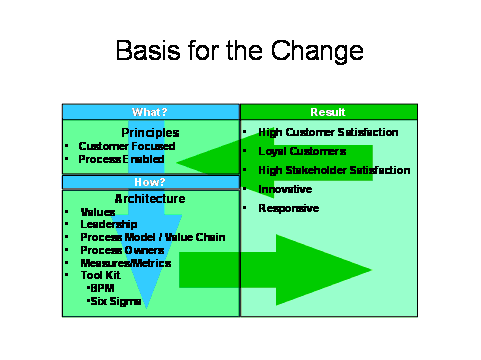Creating a Customer focused – Process Enabled Enterprise requires a business process framework, established enterprise architecture, creating “real-time” business intelligence, and a link between continuous improvement projects and key business processes. Most businesses need to evolve from a bottoms-up Six Sigma (DMAIC) approach, to a strategic framework that will set the foundation for growth, accountability, and performance management.
Business Process Management builds the framework to create strategic alignment, measure business processes using metrics aligned with business goals, and identify performance gaps that have a major impact on the customer experience and on achieving desired business results. Six Sigma will implement the methodology to prioritize the critical projects and close the gaps.
Business Process Management is an enterprise-wide, structured approach to providing the products and services your customer’s value most. By understanding the key business processes your company uses to meet these needs, the gap between customer expectations and your ability to perform begins to emerge. Processes that are inefficient or ineffective in delivering what customers require are clearly identified and targeted for improvement. As the entire organization begins to measure performance in terms of critical, customer-driven requirements, employees no longer think of themselves as functional managers responsible for functional outputs. Instead, they see their roles in the context of a greater, more important goal – satisfying and creating loyal customers. As process thinkers, they consider the potential impact of their actions and decisions upstream and downstream and ultimately on the company’s ability to deliver what it promises its customers.
Business Process Management transforms reactive organizations into innovative leaders – with the speed and agility to anticipate change before the market demands change.
In theory, Six Sigma is based on business process principles. This is clearly articulated in the book The Six Sigma Way, which is arguably one of the most articulate texts on Six Sigma. Yet, Six Sigma is frequently implemented in a traditional, departmental paradigm without much reliance on business process thinking. Executives and a number of Black Belts are trained. Black Belts are assigned to various functions or departments in the enterprise. Additional Black Belts and Green Belts are trained in each of these departments and then the race is on to identify areas where Six Sigma can be deployed to realize cost savings using the traditional DMAIC (define, measure, analyze, improve, control) methodology. What’s even worse is that in many firms, one of the key measures of Six Sigma program success is the number of projects completed. That’s reminiscent of the old Human Resources paradigm where the number of participants trained assesses the success of a training program.
It is little wonder that many Six Sigma practitioners complain of the difficulty in identifying the best opportunities to apply Six Sigma techniques, and of the fact that there are frequently overlapping and redundant Six Sigma projects. Many Six Sigma programs only generate “pockets of excellence.” Typical Six Sigma – DMAIC and DMADV – projects by themselves will not create sustainable organizational change.

Business Process Management is the methodology that links improvement and process design efforts directly to the management system and to organizational strategy. It allows organizations to complete a difficult transformation to one in which the entire organization is continuously focused on ensuring the customers’ needs for effective process performance and the business’ need for efficiency and profitability. By structuring the entire improvement initiative according to business processes there would be fewer overlapping initiatives and more cross-departmental collaboration. Because this would create a big picture view, leadership could decide, based on the size of the performance gap to deploy the Six Sigma methodology and its rigor for the application of measurements, statistical analysis and the disciplined approach to resolving the problems.
Business Process Management includes a set of tools to document, measure, monitor, and control processes. It establishes ongoing accountability for managing entire cross-functional processes to satisfy customer Critical to Quality (CTQ’s) and process goals, and explicitly ties the results of the Key Process Indicators (Y’s) to the strategy of the organization.
Six Sigma provides a set of tools to make and sustain dramatic improvements to business processes. When Business Process Management and Six Sigma are used together they provide the basis for improved performance and growth, as well as a truly Customer Focus enterprise.

















